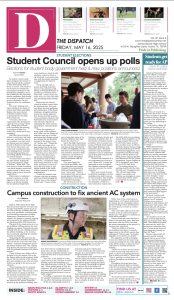Weighting of Grades: What is the Purpose?
February 3, 2019
Six weeks of fumbling on quizzes, hive-inducing homework, and rigorous studying in preparation for a single test. Bracing for 70% of a class’ average determined by a one-hour test with a ¼ chance of the future of a core class contributing to acceptance into a dream college.
There’s always a knot of internal panic, a preparation for the looming danger of the next test. I’ve been there, and I have determined the weighting of grades is pointless.
In most classrooms, the standard is the same. One or two tests taken within the span of an hour or two will account for the overwhelming majority of a student’s grade. It doesn’t matter if they’ve completed every other assignment, or toughed it out in order to complete a project, those activities are inevitably trivialized.
From the article The Effects of Grades on Students, “[The] Organization for Economic Co-operation and Development [says test]s and grades are not supposed to be a synonym for assessments.” Therefore, testing doesn’t accurately reflect the information they’ve learned.
Despite the insinuations made by most teachers, which entails that comprehensive studying for a test will somehow magically make the information a long-term memory useful for daily life, is just not so. In a study documented by Daniel T. Willingham, information retention decreases by about 65% over the course of a few years. The effectiveness of testing is sorely inflated by grading administrations, and the public is unfortunately misinformed.
The studies done on student stress and the questionable nature of assessing through tests show the falsity of heavy-weighted testing.
Daily grades and homework should be valued at 25% of grades. According to the National Parent Teacher Association, students should increase their workload each day by about ten minutes a school year, starting from first grade. In 2013, the University of Phoenix conducted a study and found that high schoolers, on average, receive about 3.5 hours worth of homework every day.
If we’re doing that much homework and projects, shouldn’t that be more reflective of our skill and hard work in a subject? It requires more engagement with content and comprehension than a test that only assesses memorization or very specifically formatted and unpractical essays.
Quizzes are meant to track progress in a student, and quizzes provide important information for class while motivating students to learn the information without the fear that one failure will irreparably damage their average. They prepare students for tests and also serve to determine if students are struggling, so that those students can get needed help.
Testing should be accountable for 45% of grading. Not only would this take off a massive amount of anxiety, but it ensures that the most important subjects of a class are understood while allowing the more individualized perspectives and assignments from students to be bolstered.
Testing shouldn’t be the end-all-be-all, since all activities students do for each class has something to contribute. Less specific conditions allows individual expression, and less major grading allows leeway for supporting the needs of each student.
Let’s do our best to exemplify fairness and educate students strategically in class by weighting grades as effectively as possible.









